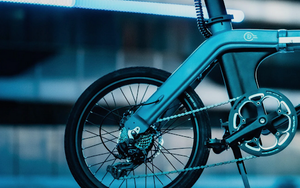Are Electric Bikes Good for Commuting?
Sep 18, 2024
Electric bikes have gained popularity in recent years as a convenient and eco-friendly mode of transportation. With their electric motor assist, these bikes provide a pedal-assisted boost, making them an attractive option for commuting. But are electric bikes really good for commuting? In this guide, we will explore the benefits, potential drawbacks, and tips for choosing and using electric bikes for your daily commute in the UK.
Understanding Electric Bikes
Before diving into the advantages and disadvantages of commuting with electric bikes, let's take a brief look at what electric bikes are and their key features. Electric bikes, also known as e-bikes or pedelecs, are bicycles equipped with an electric motor that assists the rider's pedalling power. They are designed to amplify human effort, making cycling easier and more enjoyable.
What is an Electric Bike?
An electric bike consists of a traditional bicycle frame, wheels, and pedals, but with the addition of a battery-powered electric motor. This motor provides assistance when the rider pedals, enabling them to cycle longer distances, tackle hilly terrains, and reach higher speeds without exerting excessive effort.
They’re proving popular too, with research finding that 5% of adults and 14% of UK cyclists saying they are “likely” to buy an e-bike for sale over the next 12 months, which is around 2.78 million people.
Key Features of Electric Bikes
Electric bikes come with several features that distinguish them from conventional bicycles. These features include:
- Motor: An electric motor that assists the rider's pedalling power.
- Battery: A rechargeable battery pack that powers the motor.
- Controller: An electronic control unit that manages the motor's speed and power output.
- Sensor: A sensor that detects the rider's pedalling cadence and determines the amount of assistance required.
- Display: A display panel that shows information such as speed, distance, battery level, and more.

The Benefits of Commuting with Electric Bikes
Efficiency and Speed
One of the main advantages of commuting with an electric bike is the efficiency and speed it offers. Electric bikes allow riders to cover longer distances and arrive at their destinations faster compared to traditional bikes. The motor assist helps cyclists conquer hills and headwinds effortlessly, enabling a quicker and more enjoyable commute. For example, the Beameo Cosmo can reach speeds of 25 km/h.
Health and Fitness Benefits
Contrary to popular belief, electric bikes still provide health and fitness benefits. While the electric motor assists with pedalling, riders can still choose to pedal with varying degrees of effort. This means you can adjust the level of assistance to match your fitness level or desired workout intensity. Electric bikes encourage physical activity, contribute to cardiovascular health, and promote an active lifestyle.
Environmental Impact
Commuting with an electric bike is a greener alternative to driving a car or using public transport. Electric bikes produce zero emissions, helping to reduce air pollution and greenhouse gas emissions. By choosing an electric bike for your daily commute, you are making a positive contribution to the environment and reducing your carbon footprint.

Potential Drawbacks of Electric Bike Commuting
Initial Costs and Maintenance
While electric bikes offer numerous benefits, they tend to be more expensive than traditional bicycles. However, with the increasing popularity of electric bikes, prices are becoming more affordable, and there is a wide range of options available in the market. Additionally, electric bikes require regular maintenance, including battery recharging, tire inflation, and brake checks, to ensure optimal performance and safety.
Battery Life and Charging Time
Another consideration is the battery life and charging time of electric bikes. The distance an electric bike can travel on a single charge varies depending on factors such as terrain, rider weight, and assistance level. It's important to choose an electric bike with a battery capacity that suits your commuting needs. Charging times can range from a few hours to overnight, so planning your charging schedule is crucial to ensure your electric bike is always ready for your daily commute.
Legal and Safety Considerations
When commuting with an electric bike in the UK, it's essential to be aware of the legal and safety regulations. Electric bikes are classified into different categories based on their power and speed capabilities. Class 1 and 2 electric bikes, which provide assistance up to 15.5 mph, are allowed on cycle paths, while Class 3 electric bikes, which assist riders up to 28 mph, are subject to certain restrictions. It's important to comply with local laws, wear appropriate safety gear, and exercise caution while sharing the road with other vehicles.

Choosing the Right Electric Bike for Commuting
Factors to Consider
When selecting an electric bike for commuting, several factors should be taken into account:
- Range: Consider the distance you need to travel on a single charge and choose an electric bike with an appropriate range.
- Battery Type and Capacity: Look for a reliable battery with sufficient capacity to suit your commuting needs, considering factors such as terrain and the level of assistance required.
- Motor Power: The motor power determines the level of assistance you will receive. Choose a motor power that aligns with your commuting requirements.
- Frame and Comfort: Ensure the electric bike's frame size and design provide a comfortable riding experience for your daily commute.
- Additional Features: Consider features such as lights, mudguards, racks, and suspension for added convenience and practicality.

Tips for Commuting with an Electric Bike
Preparing for Your Commute
Prior to your commute, make sure to:
- Charge the Battery: Ensure your electric bike's battery is fully charged to maximise range and avoid running out of power during your journey.
- Check Tire Pressure: Regularly check and maintain proper tire pressure for optimal performance and safety.
- Plan Your Route: Familiarise yourself with the best routes for your commute, taking advantage of cycle lanes and quieter roads when possible.
Navigating Traffic and Weather Conditions
When commuting with an electric bike, it's important to:
- Be Aware of Traffic: Stay vigilant and be aware of other road users, signalling your intentions clearly and following traffic rules.
- Adapt to Weather Conditions: Prepare for varying weather conditions by wearing appropriate clothing and ensuring your electric bike is equipped with lights and reflectors for visibility.
Storing and Securing Your Electric Bike
Finally, when it comes to storing your electric bike:
- Secure Your Bike: Invest in a sturdy lock and secure your electric bike properly when leaving it unattended to prevent theft.
- Consider Storage Options: If you don't have a secure storage space at home or work, consider using bike lockers or designated parking facilities.
Conclusion
In conclusion, electric bikes can be an excellent option for commuting in the UK. They offer efficiency, speed, and health benefits while contributing to a greener environment. While considering factors such as initial costs, battery life, and legal regulations, choosing the right electric bike and following essential tips will ensure a smooth and enjoyable commute. So, why not consider hopping on an electric bike and enjoy a hassle-free journey to work or school?






